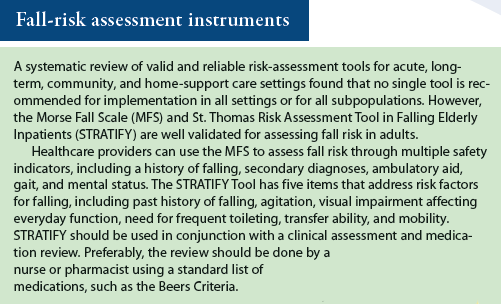Dementia Fall Risk for Dummies
Dementia Fall Risk for Dummies
Blog Article
The 6-Second Trick For Dementia Fall Risk
Table of ContentsThe Best Guide To Dementia Fall RiskFascination About Dementia Fall RiskGet This Report on Dementia Fall RiskHow Dementia Fall Risk can Save You Time, Stress, and Money.Excitement About Dementia Fall Risk
Based on signs and signs and symptoms, such as proof of head injury or a new focal neurologic deficit, calculated tomography or MRI of the brain may be shown. An evaluation for reasons of syncope ought to be conducted just if there is strong uncertainty, as when it comes to persistent, unexplained drops
Health care companies utilize an autumn danger analysis to determine your danger aspects for dropping and make handy referrals. A fall danger assessment is important due to the fact that recognizing which variables boost your chances of falling aids you: Decrease your threat of dropping or harming on your own.
Maximize your capability to relocate and be energetic. Maintain a healthy and balanced, independent life. All grownups 65 years and older need to have an initial loss threat testing. Your doctor might ask you whether you: Feeling unsteady when standing or strolling. Have dropped in the past year. Fret about dropping. If you answer yes to any one of these questions, your doctor will certainly recommend an added, a lot more extensive assessment.
The 15-Second Trick For Dementia Fall Risk

, and objectives especially customized to individuals who are at risk for falls. A is specified as an event that results in a person coming to relax inadvertently on the ground or floor or various other reduced level (WHO, 2021).
Dropping is the second read here leading reason of fatality from unintended injuries internationally. It is approximated that autumn death rates in the United state
A Biased View of Dementia Fall Risk
If this rate proceeds, the CDC prepares for 7 fall deaths every hour by 2030.
Each year, over 800,000 clients are hospitalized because of drops. Registered nurses play a significant duty in avoiding drops for their individuals with education, reviewing autumn danger, developing much safer settings, and giving interventions in protecting against injuries from falls.
Falls are due to several aspects, and an alternative technique to the private and setting is vital. Intend an individual is taken into consideration at high threat for drops after the testing.
All About Dementia Fall Risk
A calls for using a confirmed device that scientists have analyzed to be useful in calling the root causes of falls in a person. As a person's wellness and scenarios change, review is called for. The degree of loss threat can be established utilizing the assessment of inherent and external factors. Requirement assessment devices can likewise be made use of (reviewed below).
People are more most likely to fall once more if they have maintained several drops in the previous 6 months. The older population is at boosted danger of fall-related readmissions based on a research study recognizing the factors anticipating of repeat drops associated results (Prabhakaran et al., 2020). Persons with impaired awareness and disorientation might not recognize where they are or what to do to help themselves.
In addition, complication and impaired judgment enhance the client's possibility of dropping. The capacity of individuals to protect themselves from drops is impacted by such aspects as age and growth. Older people with weak muscles are more probable to drop than those who preserve muscle toughness, versatility, and endurance. These modifications include lowered aesthetic feature, damaged color understanding, modification in center of mass, unstable stride, reduced muscle mass stamina, lowered endurance, transformed deepness understanding, and postponed feedback and reaction times.
Some Known Incorrect Statements About Dementia Fall Risk
Less contrast level of sensitivity was rather connected with both increased rates of falls address and other injuries, while reduced aesthetic acuity was only related to enhanced loss rate (Timber et al., 2011). Sensory understanding of ecological stimuli is paramount to safety and security. Vision and hearing disability limitation the individual's ability to view hazards in the environments.
Older adults who have poor equilibrium or trouble walking are most likely to drop. These troubles might be connected with absence of exercise or a neurological cause, joint inflammation, or various other medical conditions and therapies. An essential danger variable highlighted in a study is that adults Learn More Here with rheumatoid arthritis go to high danger of drops, including swollen and tender reduced extremity joints, tiredness, and use psychotropic medications (Stanmore et al., 2013).
Report this page